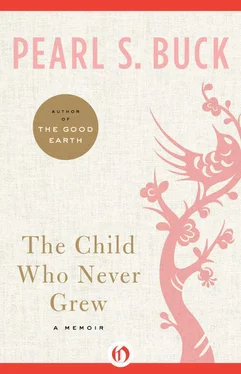I answer the parents by saying that where a private institution would bring severe sacrifice on every member of the family for the sake of one, I would find a good state institution, even if I had to move my home to another state, and there I would put my child.
When the child is safely in his new home, what are the further responsibilities of the parent? They are many. The child needs the parents as much as before. There should be regular visits, as frequent as possible. Do not think that the children do not know. I have to endure heartbreaking moments every time I go to visit my child, for inevitably some other little child comes and takes my hand and leans against me and asks, “Where is my mamma?”
The housemother whispers over her head, “Poor little thing, her folks never come to see her. Her grandmother came to see her two years ago and that’s the last.”
The little thing’s heart is slowly breaking. For these children are always children. They are loving and affectionate and they crave to be loved exactly as all children do. There are other children who come to tell me, eyes glowing, “My daddy and mommy came last week to see me!” Even the ones who cannot speak will come to show me a new doll that the parents brought.
Ah, they know, because they feel! The mind seems to have very little to do with the capacity to feel.
Another responsibility of the parent is to watch always the person in direct charge of the child. I said that I chose my child’s permanent home by finding as the head the sort of person whom I could trust. Today, were I to choose again, I would also go into every cottage and look at the type of attendant there. Were they the hard-faced professional type, the ones who go from institution to institution, callous, cruel, ready to strike a child who does not conform, I would reject that place. For the most important person in an institution, so far as the child is concerned, and therefore so far as the parent is concerned, is not the executive, and not the man or woman in the offices, not even the doctor and the psychologist and the teacher, but the attendant, the person who has the direct care of the child.
A cruel and selfish attendant who has not at heart the welfare of the child can undo all the work of the teacher and the psychologist. Your child cannot benefit by any teaching unless he is happy in his daily life in his cottage. The attendant must be a person of affectionate and invincibly kind nature, child loving, able to discipline without physical force, in control because the children love him or her. Whether this attendant is well educated is not important. He must understand children, for he has in his care perpetual children.
Any sign of cruelty or injustice or carelessness on the part of attendants should be at once reported by conscientious parents. Do not think that secret bribes or tips will protect your child from a bad attendant. He will take your money and when he is alone with the children, as he is so much of the time, he will treat your child exactly as he does the others.
A third responsibility which the parent has to the child in the institution is to see that the atmosphere in which he lives is one of hopefulness. I have observed that this atmosphere is best in those institutions which carry on research as one of their functions. A place where the care is merely custodial is apt to degenerate into something routine and dead. No child ought to be merely something to be cared for and preserved from harm. His life, however simple, means something. He has something to contribute, even though he is helpless. There are reasons for his condition, causes which may be discovered. If he himself cannot be cured or even changed, others may be born whole because of what he has been able to teach, all unknowingly.
The Training School at Vineland is an excellent example of what I mean. For many years it has maintained an active research department. As I said, it was the first institution in this country to use and adapt the Binet test, and there the Social Maturity Scale was developed. Its work with birth-injured children and cerebral palsy has been notable, and the vigorous men and woman who have spent their lives there learning from the children, in order that they may know better how to prevent and to cure, have infused vitality into the life of the institution, and into the whole subject of mental deficiency beyond.
Parents may find comfort, I say, in knowing that their children are not useless, but that their lives, limited as they are, are of great potential value to the human race. We learn as much from sorrow as from joy, as much from illness as from health, from handicap as from advantage — and indeed perhaps more. Not out of fullness has the human soul always reached its highest, but often out of deprivation. This is not to say that sorrow is better than happiness, illness than health, poverty than richness. Had I been given the choice, I would a thousand times over have chosen to have my child sound and whole, a normal woman today, living a woman’s life. I miss eternally the person she cannot be. I am not resigned and never will be. Resignation is something still and dead, an inactive acceptance that bears no fruit. On the contrary, I rebel against the unknown fate that fell upon her somewhere and stopped her growth. Such things ought not to be, and because it has happened to me and because I know what this sorrow is I devote myself and my child to the work of doing all we can to prevent such suffering for others.
There is one little boy in my child’s school whom I often go to see. He is little because he is only about seven in his mind. His body now is almost forty years old. He has a grave face and there is a forlorn look in his eyes. His father is a famous man, wealthy and well known. But he never comes to see his son. The boy’s mother is dead. When someone approached this father for a gift for a new kind of research he banged his desk with his fist and said, “I will not give one cent! All my money is going to normal people.”
Callous? He is not callous. His heart is bleeding, his pride is broken. His son is an imbecile— his son! In these years he has thought of himself and his loss, and he has missed the joy he might have had in his child — not the joy he sought, of course, but joy for all that.
There is another father — they are not always fathers, either — whose boy loves to work with the cows. I see the lad sometimes, a handsome fellow. He is usually in the dairy barn, caring for the cows, brushing them clean, loving them. I saw his father there one day, that brilliant able man, and he said, “It does seem that if my boy can learn to use the milking machine he could learn to do something better.”
The head happened to be there that day and he said, “But there is nothing better for him, don’t you see? The best thing in the world for each of us is that which we can best do, because it gives us the feeling of being useful. That’s happiness.”
So what I would say to parents is something I have learned through the years and it took me long to learn it, and I am still learning. When your little child is born to you not whole and sound as you had hoped, but warped and defective in body or mind or perhaps both, remember this is still your child. Remember, too, that the child has his right to life, whatever that life may be, and he has the right to happiness, which you must find for him. Be proud of your child, accept him as he is and do not heed the words and stares of those who know no better. This child has a meaning for you and for all children. You will find a joy you cannot now suspect in fulfilling his life for and with him. Lift up your head and go your appointed way.
I speak as one who knows.
Yet none of us lives in the past, if we are still alive ourselves. It is inevitable that, as young parents in their time experience again the old agony and despair when their children are among those who can never grow, they demand some cause for hope. Other ills have been cured and research is being carried on for those we still do not know how to heal. All must be healed, of course. People must not die of cancer or polio or heart disease. Neither should they be mentally deficient if it can be prevented or cured. There cannot be a choice of which will be first. The battle of life must be fought on all fronts at the same time.
Читать дальше












